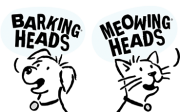Did you know obesity in the UK is now as much of a problem among our pets as in people? Sadly canine obesity is by far the most common nutritional disorder seen in dogs – caused simply by more energy being taken in than used, leading to persistent and potentially life-threatening energy surplus. This excess is stored mainly as fat, but other important contributing factors including age, sex, reproductive status, inactivity, genetics, food intake, highly palatable diet, treats, environment, lifestyle, and underlying diseases can all help increase to weight gain. Signs of pet obesity can include struggling to feel/see your pet’s ribs, spine or waist line, to abdominal sagging or perhaps a bigger, rounder face. Fat pets commonly reluctant to exercise with overweight dogs often lagging behind, panting, appearing both tired, and even ‘lazy’.
As responsible pet owners, we must always prevent pet obesity by feeding a healthy diet e.g. Barking/Meowing Heads, as well as avoiding scraps or leftovers, always checking feeding guides, weighing out recommended amounts, and ensuring every family member has clear pet-feeding instructions too. Remember when introducing a new food to always do it slowly over a few days. It’s vital cats and dogs maintain a healthy weight, as obesity can commonly lead to diabetes, heart disease, depression, and joint problems e.g. arthritis. Obese cats are typically harder to slim down being less likely to be taken for a walk, etc, so feed them Meowing Heads and encourage appropriate exercise. If you suspect your pet is overweight, please make an appointment with your vet ASAP as they’re several things you can do to help. By gradually changing feeding habits, increasing exercise, looking closely at food type/intake, and developing a sensible feeding plan, diary, including regular vet visits for free weight checks recording your pet’s progress. High-protein, high-fibre but low-fat diets are typically recommended for weight loss, giving dogs or cat the feeling of being full with more energy. You’ll soon notice that when your pet loses weight, they’ll be much happier and keener to exercise. Why not start right away by replacing sweet fatty dog treats with raw carrot sticks? Or even planning some agility sessions? For more advice about canine or feline obesity and how to safely help your pet lose weight, call your vets and make an appointment before it’s too late – your pet will love you even more and live a longer and happier life because of it!

